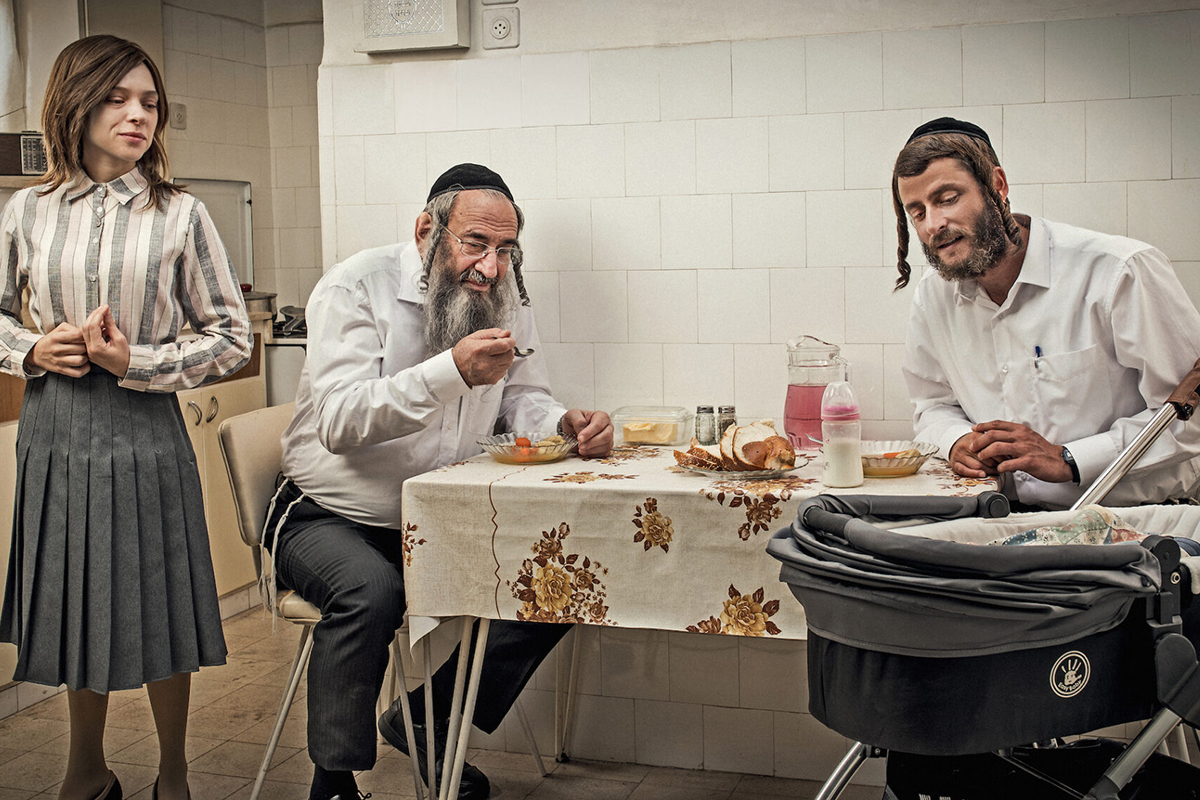Like many, I’ve spent the last couple of weeks physically on my couch but mentally in Geula. I’ve been catching up on the much-anticipated third season of Shtisel, the widely-praised Israeli drama following the lives of a Haredi family living in Jerusalem. I’ve been closely following the lives of the extended Shtisel family and deeply invested in their happiness. I’ve cried, shouted at the television in disbelief and rage, and started putting cumin in my omelets.
Shtisel is great television and has been widely praised not only for being exquisitely crafted, but also for its complex portrayal of the Haredi experience. Compared to so much of what’s out there on American television screens, this kind of portrayal of Jews generally is nothing short of a revelation. It doesn’t erase the specifics of these characters’ lives in order to make them palatable. It’s conscious that a viewer might be an outsider to this community, but doesn’t cater that perspective at the expense of portraying its subjects with depth. The narrative leaves room for humor and grief in equal measure.
While there are certainly instances of great Jewish rep to be had on American TV, it sometimes feels as though we’re expected to be content with scraps: side characters who’s Judaism gets a one-off mention during the annual Christmas special; cringey stereotypes; bad accents; and, of course, brisket jokes. We’re supposed to be okay with Jewishness being portrayed chiefly as a kind of affliction, a cause of neurosis or a thing to escape from at the nearest opportunity.
This is what I think makes Shtisel such an exciting watch. Not only is it incredibly Jewish, but it is so in a way that feels markedly different from what we’re often meant to expect from Jewish representation on TV.
But while Shtisel is a refreshing depiction of Jewish life, it’s not a singular feat. In fact, the very things that make it so refreshing are the same thing that makes a lot of Israeli TV enjoyable to watch generally, and why I insist that anyone who loves this series seek out more.
Growing up with an Israeli parent who is deeply engaged with Israeli arts and pop culture, it took me a long time to understand that many American Jews don’t necessarily consume Israeli cultural content outside of formal Jewish institutional settings. It’s not hard to come up with plausible explanations. Until a few years ago, watching Israeli TV required 1) acquiring DVDs, usually only possible via international travel or specialty stores, and 2) a DVD player that can play non-US formats, or 3) access to film festivals. But even with the wider accessibility we now have thanks to the major streaming platforms, some I suspect are still put off by the language barrier, or simply don’t think it will speak to their experiences as Jews. Others are conditioned to treat any encounter with anything Israeli as a political act, or else presuppose what Israeli narratives must look like before actually watching them.
But for those interested in watching a more diverse range of Jewish content, neglecting Israeli television means neglecting frankly the most nuanced portrayals of Jews and Jewish storytelling in any visual medium. While Israeli TV is far from perfect or complete in depicting the totality of Israeli life, it regularly features Jewish characters and plotlines that are hard to imagine existing in an American context.
Lehiyot Ita/Baker and the Beauty, available on Prime, a soapy romantic comedy about a working-class Yemenite-Israeli baker who falls for a wealthy Ashkenazic supermodel, is as much about class and ethnicity in Jewish contexts as it is about the romance and smoldering leads. HaMidrasha/Mossad 101, available on Netflix, is a genre-bending thriller about a diverse set of Israelis trying to become field agents for the Mossad while tackling everything from chronic illness to ageism to conversion to Jewish extremism. The Yom Kippur War drama Sha’at Ne’ila/Valley of Tears focuses much of its narrative on the Israeli Black Panthers and the struggle for social and political equality among Israelis in the midst of the existential threat of war. Tehran is a powerful meditation on modern Persian Jewish identity dressed as an extremely stressful spy thriller. Plus, lest we forget, Juda is a stellar series about Jewish vampires. Jewish vampires! A whole show of them!
And that’s not even the shows still waiting to be picked up by a streaming platform. There’s Nevsu, the comedy about a blended Ashkenazic and Ethiopian Israeli family, Shababnikim, about yeshiva students behaving badly, as well as shows like Arab Labor and Muna, which focus on the lives of Israeli-Arabs navigating Jewish Israeli society.
I watch these shows not only because they are something that makes me feel close to my family, but because they fulfill that longing for a Jewish story that doesn’t sacrifice specificity and detail in the name of marketability to a non-Jewish audience. They are the very things I see people calling for regularly on social media: diverse, intimate stories more reflective of the sheer variety of who we are as a people, and the stories we’re capable of telling.
Plus, they’re just great and engrossing to watch. With the pandemic still very much a reality, I suspect you could use something new to watch this weekend. So, if you’re still a puddle of emotions after the Shtisel season finale, might I suggest another Israeli series? Because nothing says healing like Jewish vampires.



